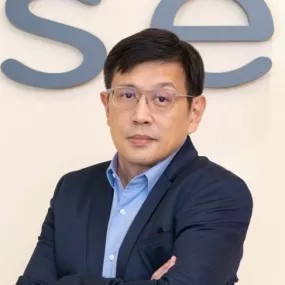HCMC – Taiwan is deepening cooperation with Southeast Asian economies, including Vietnam, to bolster regional semiconductor supply chains as global technology industries are under restructuring pressure following the Covid-19 pandemic and ongoing geopolitical tensions.
Speaking with The Saigon Times, Terry Tsao, Global Chief Marketing Officer and President of Taiwan at SEMI, said Taiwan aims to foster cooperation under Taiwan’s New Southbound Policy, which was launched in 2016 to enhance ties with 18 markets in Southeast Asia, South Asia, and Australia.

The upgraded Digital New Southbound Policy leverages Taiwan’s strengths in ICT and semiconductors to support digital transformation in the region. It emphasizes public-private-academic collaboration, industrial R&D exchange, and cross-border talent development. These include semiconductor capability training programs in India, smart healthcare projects in Vietnam to modernize public health infrastructure, and joint efforts in Thailand to develop digital tolling systems that improve transportation infrastructure.
Southeast Asia’s growing role
Southeast Asia is emerging as a key hub for semiconductor manufacturing, with over US$35 billion in semiconductor-related investments announced across Malaysia, Vietnam, and Singapore since 2021.
Malaysia has become a hub for advanced packaging and AI infrastructure, attracting major players such as Intel with an US$8 billion investment and NVIDIA with US$4.3 billion. Vietnam has also gained momentum, with Samsung investing US$1.8 billion in a new OLED and testing facility and Amkor opening a US$1.6 billion assembly and testing plant, both located in Bac Ninh Province. Meanwhile, Singapore continues to strengthen its role in advanced manufacturing.
Vietnam’s position in the supply chain
Vietnam is accelerating its efforts to become a stronger player in the global semiconductor supply chain. At a national meeting on August 4, Prime Minister Pham Minh Chinh, head of the National Steering Committee on Semiconductor Industry Development, highlighted the sector’s complexity and its role in global production networks. He emphasized the need to promote science, technology, innovation, and digital transformation to advance research, manufacturing, workforce training, infrastructure, and policy frameworks.
Vietnam’s semiconductor industry has made notable progress. According to the Ministry of Finance, Vietnam is home to more than 50 chip design companies employing around 7,000 engineers. The packaging, testing, and semiconductor equipment manufacturing segment includes about 15 companies with 6,000 engineers and over 10,000 technicians.
Foreign investors, including Taiwan, see Vietnam as a favorable location due to competitive labor costs, improving infrastructure, and participation in free trade agreements.
Tsao emphasized the importance of identifying strengths before pursuing deeper involvement in the semiconductor supply chain.
Taiwan’s semiconductor leadership
Taiwan remains at the heart of the global semiconductor ecosystem. In 2024, the sector contributed 18-20% of Taiwan’s GDP and 35% of its exports. Taiwan ranks second worldwide in semiconductor industry value, behind only the United States. In the foundry segment, Taiwan holds 75% of the global market and a dominant 92% share in advanced nodes.
TSMC, the world’s largest contract chipmaker, drives much of this leadership. Its projected capital expenditure is expected to grow 40% year-on-year in 2025, with ongoing development of advanced 1.6nm process technology.
Taiwan’s competitive edge stems from strong policy support, a highly skilled talent pool, and a tightly integrated ecosystem that enables rapid problem-solving and collaboration.
Talent development and training
Talent remains the most critical factor for semiconductor growth, but Southeast Asia faces three key challenges: a shortage of skilled workers in manufacturing, IC design, and digital operations; limited advanced training capacity in microelectronics; and difficulty retaining engineers amid intense global competition.
Taiwan has addressed these talent gaps through its New Southbound Policy by investing in education and workforce development. Since 2016, more than 50,000 students from ASEAN and South Asia have studied or trained in Taiwan through expanded scholarship and internship programs aimed at attracting top regional talent.
To bridge the gap between education and industry, Taiwan has organized over 50 job fairs connecting graduates with Taiwanese companies. Additionally, 10 Taiwan Connection Centers have been established to build alumni networks and promote academic collaboration. These initiatives not only support Taiwan’s industries but also foster long-term regional partnerships.
At the NYCU International College of Semiconductor Technology (ICST), joint programs have been launched with universities in Vietnam, Malaysia, the Philippines, and India. In Vietnam, NYCU ICST partnered with the University of Science, Vietnam National University, Hanoi (VNU-HUS) to introduce the country’s first “1+1” offshore master’s program, where students spend the first year studying in Vietnam and the second year in Taiwan. As of 2025, the program has graduated 15 students.
The partnership also includes regular faculty exchanges to strengthen recruitment and academic collaboration. In addition, NYCU ICST has expanded its network through exchanges with the Vietnam National Innovation Center and Vietnam National University – Ho Chi Minh City (VNU-HCM).
Outlook for Taiwan-Vietnam cooperation
Looking ahead, Taiwan is expected to deepen its collaboration with Vietnam and other Southeast Asian markets as global supply chains continue to diversify.
According to the NYCU ICST, demand for skilled workers in the region is growing rapidly as countries such as Vietnam, Malaysia, and India expand their semiconductor manufacturing and R&D capabilities. Key areas of demand include IC design, process technology, testing, and packaging.
Employers are also seeking talent with international and cross-disciplinary skills, such as strong global communication, cross-cultural teamwork, and expertise in emerging technologies like AI, IoT, and big data. However, a shortage of high-end talent remains a challenge, as many STEM graduates choose to study or work abroad, leading to brain drain and leaving industries short of specialists in advanced manufacturing.
The upcoming SEMICON Taiwan 2025 trade show, set for September 10-12 at the Taipei Nangang Exhibition Center, will feature participants from 56 countries, covering topics such as artificial intelligence, advanced packaging, cybersecurity, and sustainability. Vietnam’s participation with a national pavilion will highlight its growing role in the global semiconductor sector.









